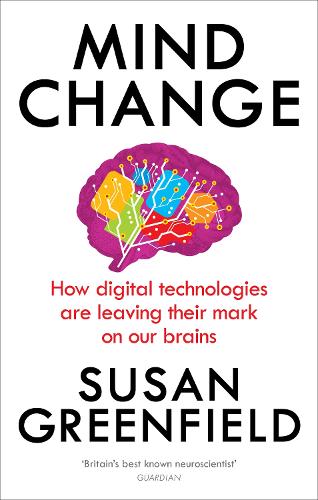
Mind Change: How digital technologies are leaving their mark on our brains
(Paperback)
Publishing Details
Mind Change: How digital technologies are leaving their mark on our brains
By (Author) Susan Greenfield
Ebury Publishing
Rider & Co
1st September 2015
2nd July 2015
United Kingdom
Classifications
Tertiary Education
Non Fiction
Impact of science and technology on society
612.8
Physical Properties
Paperback
384
Width 126mm, Height 198mm, Spine 23mm
260g
Description
Highly topical, stimulating addition to the most important debate of our time (the effects of new technology), by one of the UK's leading neuroscientists. In Mind Change, Susan Greenfield discusses the all-pervading technologies that now surround us, and from which we derive instant information, connected identity, diminished privacy and exceptionally vivid here-and-now experiences. In her view they are creating a new environment, with vast implications, because our minds are physically adapting- being rewired. What could this mean, and how can we harness, rather than be harnessed by, our new technological milieu to create better alternatives and more meaningful lives Using the very latest research, Mind Change is intended to incite debate as well as yield the way forward. There is no better person to explain the situation in a way we can understand, and to offer new insights on how to improve our mental capacities and well being.
Reviews
Greenfield asks key questionsimportantshould be read by technologists in particular * Nature *
Greenfield is not just an engaging communicator but a thoughtful, responsible scientist, and the arguments she makes are well supported and persuasive * Mail on Sunday *
Greenfields admirable goal to provide an empirical basis for discussion isan important one * Financial Times *
Fascinating...highly accessible...Greenfield is a lucid and thorough communicator * Independent on Sunday *
Greenfield has a point, however unfashionable it may be...an interesting polemic and a starting point for further debate -- Frank Dillon * Irish Times *
Author Bio
Baroness Susan Greenfield CBE is a Senior Research Fellow at Lincoln College, Oxford University. A scientist, writer, broadcaster and Cross-Bench member in the House of Lords, she specialises in applying neuroscience to fundamental issues such as the impact of 21st-century technologies on the mind, how the brain generates consciousness, and the development of innovative approaches to neurodegenerative diseases such as Alzheimer's and Parkinson's She has been the recipient of 31 honorary degrees from both British and foreign universities , and of many awards including Chevalier Legion d'Honneur from the French Government e,and an Honorary Fellowship from the Royal College of Physicians, as well as being selected as Honorary Australian of the Year in 2006. She appears regularly on radio and television and frequently gives talks to both the public and private sectors.
